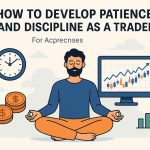Monthly Archives: September 2025

The First Steps to Becoming a Profitable Trader
Understanding the Basics of Trading
To become a profitable trader, it’s crucial to build a strong foundation in trading principles. The journey starts with understanding key concepts like markets, trading instruments, and order types. Recognizing the different types of markets, such as stocks, forex, and commodities, enables traders to choose where to focus their efforts.
Exploring Different Types of Markets
Every market operates under different rules and mechanisms. Each provides unique opportunities and challenges. Stocks represent shares in a company’s ownership and are traded on stock exchanges like NYSE or NASDAQ. Forex, short for foreign exchange, involves trading currencies against each other in a decentralized global market. Commodities involve raw goods such as oils, metals, or agricultural products. The selection of a market often depends on personal interests, risk tolerance, and capital availability.
Education and Research
A trader’s education is continuous. Begin by studying the markets you are interested in, and learn about various trading instruments. Books, online courses, and seminars can provide valuable insights. Additionally, staying updated with financial news and market analysis is essential. Leveraging resources such as Investopedia or financial news websites helps in understanding current market trends and economic events.
Learning about Trading Instruments
Trading instruments are the assets or contracts being traded within a market. For instance, in the stocks market, individual stocks or shares are traded. In forex, currency pairs like EUR/USD or GBP/JPY are the instruments. Furthermore, one can trade futures contracts where you agree on a price of an asset today for delivery at a future date. Understanding these instruments, their intricacies, and how they behave in different market conditions is fundamental to making informed trading decisions.
Developing a Trading Plan
A well-structured trading plan is vital for success. This plan should include your trading goals, risk tolerance, and strategies. It’s important to define:
What markets will you trade?
– Identifying the markets that align with your interests and capital strength is crucial.
What strategies will you employ?
– Whether it be scalping, day trading, or swing trading, choosing a strategy that aligns with your lifestyle and objectives is key.
How much capital will you risk per trade?
– Determining this helps in defining risk tolerance and maintaining financial stability.
This plan acts as a roadmap, helping to keep emotions in check and make informed decisions.
Practicing with Paper Trading
Before investing real money, it’s advisable to start with paper trading. This involves practicing trading strategies in a simulated environment without financial risk. Most trading platforms offer paper trading accounts. They allow you to test your strategies and understand market dynamics better.
Gaining Practical Experience
While theoretical knowledge lays the groundwork, practical experience builds a trader’s instincts and familiarity with different trading scenarios. Regularly engaging with the simulated environment prepares a trader for the real market’s ups and downs, facilitating the development of effective strategies and risk management techniques without financial repercussions.
Managing Risk Effectively
Risk management is crucial for long-term profitability. Always know the amount you are willing to lose on each trade and use stop-loss orders to limit potential losses. A common rule is to risk only a small percentage of your trading capital on a single trade, often recommended as 1-2%.
Utilizing tools like portfolio diversification and employing techniques like hedging can help manage risk. Diversifying across different markets can mitigate the impacts of a poor-performing asset on your overall capital.
Choosing a Reliable Broker
Selecting the right broker is a critical decision for traders. Aligning with a broker that suits your trading profile is pivotal. Consider factors like:
Security: Ensure your broker has solid security protocols and is regulated by the relevant authorities in your jurisdiction to protect your investments.
Fees: Consider the trading fees, including commissions, spreads, and any additional charges.
Platforms: Explore the tools, analytics, and user interface provided by the broker’s platform. A platform that is intuitive and equipped with necessary tools can aid effective trading.
Customer service: Timely support and assistance are vital. Research the broker’s reputation for quality customer service.
Thorough research and comparisons between available options are essential to making an informed choice.
Psychological Preparation
Trading can be psychologically challenging. It requires discipline, patience, and a calm mindset. Developing the mental fortitude to stick to your trading plan even during downturns is essential. It’s also important to remain adaptable, learning from both successes and failures.
Maintaining Emotional Balance
The volatility in trading can often lead to unavoidable emotional responses. Managing these emotions effectively can prevent impulsive decisions that may adversely affect your trading results. Techniques like meditation, regular breaks, and setting predefined trading rules can significantly enhance a trader’s ability to maintain emotional stability and focus.
Continuous Learning and Adaptation
The markets constantly evolve, and staying profitable requires continuous learning and adaptation. Keep refining your strategies and research new techniques. Engage with trading communities and forums for shared experiences and tips.
Understanding changing market dynamics, trends, and technological advancements are part of growing as a trader. Engage in periodic review sessions of your trading activities to identify learning opportunities and develop improved strategies.
Connecting with Trading Communities
Engaging with trading communities can offer fresh perspectives and knowledge. Connecting with experienced traders and participating in discussions can further one’s understanding and present new strategy ideas. However, it’s crucial to ensure these interactions have constructive and credible insights.
By taking these initial steps, you can build a strong foundation for becoming a profitable trader. Remember, trading is not a get-rich-quick scheme; it requires dedication, discipline, and ongoing learning.

How to Improve Your Trading Skills Over Time
Understanding the Fundamentals
To enhance your trading skills, developing a comprehensive understanding of market fundamentals is essential. This begins with grasping basic concepts such as supply and demand, various market structures, and the roles played by different financial instruments. The interplay of supply and demand affects price movements in almost every market domain. Additionally, understanding how market structures function will give you a better insight into price formations and volatility levels.
To gain this foundational knowledge, leverage the multitude of online resources available today. Renowned platforms like Investopedia provide extensive materials and courses. Moreover, reading books authored by established trading experts can offer invaluable insights into the intricacies of financial markets. Such readings can demystify complex topics and provide guidelines and strategies proven successful over time. Furthermore, consider enrolling in courses provided by reputable educational institutions, which can furnish a structured and in-depth study of market fundamentals.
Technical and Fundamental Analysis
When engaging in trading, a trader leverages both technical analysis and fundamental analysis to make informed decisions. Technical analysis is the study of past market data, primarily price and volume, to forecast future price movements. This approach hinges on the belief that historical trading activity and price changes can be viable indicators of future price movements. It involves using charts and other tools to identify patterns that can suggest future buying or selling opportunities.
Fundamental analysis, in contrast, involves evaluating a security’s intrinsic value. This requires examining economic indicators, financial reports, and other qualitative and quantitative factors. Through this lens, a trader assesses a company’s financial health, industry conditions, broader economic backdrop, and various external variables that might influence asset prices.
Invest time in understanding both methodologies as they offer unique benefits and can complement each other. Online tutorials, reads, and webinars are excellent resources for acquiring such knowledge. Over time, you’ll refine your ability to decide which approach, or combination thereof, aligns with your trading goals.
Developing a Trading Plan
Creating a comprehensive trading plan is a cornerstone of consistent trading performance. The plan should outline entry and exit strategies, define risk management approaches, and establish product limitations. Strive to test and refine your plan regularly, adjusting it as market conditions or your personal circumstances evolve. Regular updates ensure that the strategy remains relevant and effective, reflecting real-world market dynamics and your growth as a trader.
Implementing a well-structured trading plan minimizes the influence of emotions on your trading decisions. This disciplined procedure serves as a safeguard against impulsive choices that could affect financial outcomes.
Risk Management Techniques
Effective risk management prevents potential losses from surpassing potential gains. It incorporates strategies and tools that help manage your exposure wisely. Techniques such as stop-loss orders are essential for limiting maximum loss on any trade. Position sizing, determining how much capital to allocate per trade, also plays a significant role in risk management.
Understanding the risk-to-reward ratio offers another layer to informed decision-making. This relationship helps determine whether a trade offers more reward than risk—a key factor in successful trading. By consistently applying these techniques, traders can protect their capital and sustain their trading longevity.
Continuous Learning and Adaptation
The realm of trading is dynamic, necessitating an ability to adapt swiftly to new conditions. Staying informed about current events and market trends is crucial since these elements can influence trading conditions significantly. Active participation in trading communities or forums can provide opportunities for exchanging insights and strategies with fellow traders. Engaging with peers enables you to consider different viewpoints, refine your strategies, and learn tried-and-tested approaches that others use.
Platforms such as BabyPips offer community-driven interaction that encourages traders to share knowledge and learn from each other. Participating in seminars or workshops can also be instrumental in keeping your skills sharp and informed by the latest market developments.
Another beneficial learning approach involves paper trading, which involves engaging in practices using simulated trading environments. Most brokerage platforms provide demo accounts for this purpose, allowing traders to test strategies without financial risk. Through simulated trading, you gain experience, hone strategies, and build confidence—critical aspects of effective real-world trading.
Embracing Emotional Discipline
Success in trading is not solely about technical knowledge but also about maintaining emotional discipline. Emotional forces such as greed and fear can cloud judgment, leading to erroneous decision-making. Cultivating psychological resilience empowers traders to remain calm, composed, and logical despite market volatility and uncertainties.
To maintain emotional discipline, consider incorporating techniques like mindfulness and stress management into your daily routine. These methodologies foster focus, clarity, and calmness—critical qualities for evaluating and making decisive trading actions rationally.
Enriching your trading arsenal demands dedication toward continuous learning, disciplined execution, and adaptability. By focusing on refining both technical acumen and emotional resilience, you set yourself up to improve consistently in the complex yet exciting landscape of financial markets.

How to Identify and Avoid Trading Scams
Understanding Trading Scams
Trading scams are deceptive schemes that manipulate individuals into allocating their money towards financial products or platforms that are either illegitimate or misleading. Such schemes can severely impact both novice and seasoned traders, often resulting in significant financial losses. It’s imperative to understand the characteristics of these scams, which is the first step in safeguarding oneself from falling prey to them. Knowledge is an essential tool for protecting personal and financial interests.
Common Types of Trading Scams
There are several prevalent trading scams that investors must be wary of to protect themselves from potential financial harm.
Ponzi Schemes
Ponzi schemes are one of the oldest and most notorious forms of financial fraud. The scam promises exceptionally high returns with little to no risk. It operates by generating returns for earlier investors using the capital of more recent investors. This method is unsustainable and eventually collapses when it fails to attract new investments. Ponzi schemes thrive on the trust of the participants and flourish in areas where there is little financial literacy.
Pump and Dump Schemes
This scam involves artificially inflating the price of a particular stock through false or misleading statements. The fraudsters entice investors to buy the stock, driving up its price. Once the price has been sufficiently inflated, these fraudsters sell off their shares at a significant profit. This action typically leads to a sharp drop in the stock price, leaving other investors with significant losses. Such schemes are common in poorly regulated markets where manipulation is easier due to low market liquidity.
Forex and Cryptocurrency Frauds
The foreign exchange (Forex) and cryptocurrency markets are particularly attractive to scammers due to their decentralized nature and lack of stringent regulation. Fraudsters in these markets may create fake trading platforms or make extravagant promises of high returns in a very short time frame. Investors are often lured by the potential of enormous profits but may end up losing their capital to scam operators who disappear with the funds.
Warning Signs of Trading Scams
Recognizing trading scams can be challenging due to the sophisticated methods employed by scammers, but specific warning signs can alert investors to potential risks.
Unrealistic Returns
Any trading opportunity that promises exceptionally high returns with minimal or no risk is likely a scam. Legitimate investment opportunities always involve some level of risk because financial markets are inherently volatile. Offers that appear too good to be true should be approached with caution.
Lack of Regulation
One of the critical checks before investing is determining whether the trading platform or broker is under the oversight of a recognized regulatory authority. Regulation implies that the firm adheres to specific standards designed to protect investors. Unsanctioned platforms are usually a red flag as they can operate without accountability.
High-Pressure Sales Tactics
Scammers often employ high-pressure sales tactics, urging potential investors to make quick decisions without adequate time for consideration or research. They may convey a false sense of urgency by claiming the offer is limited or time-sensitive. It’s crucial to resist these pressures and conduct due diligence before making any commitments.
Steps to Avoid Trading Scams
Adopting proactive measures is fundamental in avoiding trading scams and protecting your investments.
Conduct Thorough Research
A comprehensive investigation of the trading platform or product is necessary. This includes looking for reviews from multiple sources, extracting information from credible fintech websites, and verifying the regulatory status of the firm. Critical assessment of user feedback can also provide insight into the platform’s authenticity and reliability.
Verify Credentials
Ensure that brokers or advisory firms are registered with relevant financial authorities. Most countries maintain a database of registered entities operating in the financial sector. Accessing these records can confirm the legitimacy of the brokers you consider engaging with.
Avoid Sharing Personal Information
Exercise caution when sharing personal or financial details. Only provide such information after verifying the legitimacy of the organization you’re dealing with. Secure communication channels and privacy policies should also be evaluated before divulging sensitive information.
Report Suspected Scams
In any situation where you suspect a scam, it’s vital to report it to the appropriate financial regulatory body. This not only helps to protect your own interests but also aids in preventing others from falling victim. Authorities like the U.S. Securities and Exchange Commission (SEC) and the Commodity Futures Trading Commission (CFTC) offer platforms for reporting fraudulent activities. They play a crucial role in surveillance and enforcement against trading scams.
Conclusion
The prospect of high returns can indeed be alluring, particularly in fast-paced financial markets. However, it is essential to remain vigilant and well-informed to navigate these environments safely. By identifying warning signs and taking preventative steps, investors can significantly reduce the risk of falling victim to trading scams. In the world of trading, due diligence and informed decision-making should take precedence over the temptation of quick profits. An informed trader is a protected trader, and investing the time to understand these scams is a critical investment in itself.

How to Develop Patience and Discipline as a Trader
Understanding the Importance of Patience and Discipline in Trading
Developing patience and discipline is essential for anyone involved in trading. These traits are not only crucial for managing stress but also play a significant role in making informed decisions. Traders often face volatile markets where emotions can cloud judgment, making patience and discipline indispensable attributes for success.
Recognizing Emotional Triggers
Many traders struggle with managing their emotions during high-pressure situations. Identifying emotional triggers, such as fear or excitement, is the first step towards developing patience and discipline. Traders can benefit from maintaining a journal to note situations where emotions influenced their decisions. Over time, this can help in recognizing patterns and developing strategies to manage these emotions.
Noting recurring emotional responses to specific market events can serve as a critical diagnostic tool. These insights can aid traders in forming a more analytical and less emotionally charged perspective on trading. As they document their emotional reactions, traders may start to see that certain patterns lead to rash decisions, such as entering trades too early due to excitement or exiting too late out of fear. Understanding these triggers empowers them to preemptively counteract these responses or to adjust strategies that align more closely with their long-term objectives.
Building a Comprehensive Trading Plan
A robust trading plan serves as a roadmap, guiding traders through decision-making processes systematically. It should outline specific entry and exit criteria, risk management rules, and expected profitability. Sticking to this plan promotes discipline by keeping traders focused, thus reducing impulsive decisions driven by market fluctuations.
A detailed trading plan acts as the backbone of a trader’s strategy, reinforcing disciplined behaviors while navigating volatile markets. It meticulously details the entry and exit points based on thorough analysis rather than knee-jerk reactions. Risk management guidelines within the plan, such as setting limits on trades to prevent excessive losses, are instrumental in maintaining consistency. As traders adhere to their plans, they reduce the likelihood of emotional trading, paving the way for consistent decision-making that is based on pre-defined strategy rather than fleeting market sentiments.
The Role of Risk Management
Risk management is a critical component of disciplined trading. By defining the amount of risk per trade, traders can prevent significant financial loss. Techniques such as stop-loss orders and position sizing are common methods used to implement effective risk management. Employing these strategies requires discipline and can help in preserving capital during market downturns.
The strategic use of risk management tools is fundamental for traders who aim to sustain their portfolios over the long term. Stop-loss orders, for example, automatically trigger the sale of a position when it reaches a predetermined price. This ensures that a trader’s losses are contained, preventing emotional decisions in the heat of market volatility. Position sizing, similarly, involves determining the percentage of capital to allocate per trade, limiting exposure and minimizing risk. These methods, diligently applied, are quintessential in helping traders protect their investments while maintaining a stable footing even during unpredictable market trends.
Continuous Education and Practice
Traders must consistently expand their knowledge and refine their skills to remain disciplined. This can be done through various channels such as educational websites, attending seminars, or taking part in trading simulations. Continuous learning helps traders to adapt to changing market conditions and develop a well-disciplined approach.
To thrive in the dynamic world of trading, individuals need a commitment to ongoing education and honing their skills. Educational resources and industry seminars provide updated insights into market trends and new trading methodologies. Participating in trading simulations offers a risk-free environment where traders can practice and refine their strategies without the fear of real-world financial consequences. This iterative learning process fosters adaptability, enhances analytical acumen, and ultimately leads to a more disciplined trading approach, as traders become more adept at responding to market changes without emotional disruptions.
Developing Patience Through Mindfulness
Mindfulness practices such as meditation and focused breathing exercises can enhance a trader’s ability to remain patient. These practices encourage awareness of thoughts and emotions, allowing traders to manage their responses more effectively. Over time, this can lead to reduced anxiety and better decision-making in stressful environments.
The cultivation of patience through mindfulness involves grounding oneself in the present moment, thus reducing impulsive decisions. Techniques such as meditation allow traders to cultivate a sense of calm and focus, providing them with the clarity needed to make calculated decisions amidst market noise. By integrating mindfulness exercises into their routine, traders can mitigate stress-induced errors, maintain focus, and ensure thoughtful, well-reasoned trading conduct, ultimately contributing to more stable and patient engagement with market activities.
Setting Realistic Expectations
Patience is fostered by setting achievable goals and maintaining realistic expectations. Traders should understand that success takes time, and the road to profitability is often paved with setbacks. By setting small, attainable goals, traders can maintain motivation and develop patience as they gradually work towards long-term objectives.
The journey of trading invites the understanding that immediate success is rare, and realistic expectations are vital. Goals should be substantive yet achievable, allowing traders to experience smaller victories that build confidence. Setting incremental benchmarks encourages sustained motivation while underscoring the long-term nature of trading as a skill. Accepting market setbacks as valuable learning experiences rather than defeats further engrains patience, driving continued progress and adaptation in pursuit of trading excellence.
Accountability and Discipline
Holding oneself accountable is key to developing discipline. This can be achieved by regularly reviewing trading performance and reflecting on adherence to trading plans. Joining a trading community or finding a mentor can provide additional accountability, as peer support often encourages adherence to best practices.
Accountability mechanisms are crucial for sustaining discipline within the trading realm. Regular performance reviews ensure alignment with strategic objectives, while also offering a chance to reassess and fine-tune approaches. Engaging with a trading community or a mentor enriches this process further, as external perspectives can introduce new efficiencies and act as a support system that reinforces positive trading habits. This collaborative exchange encourages transparency, places a spotlight on areas for improvement, and maintains the integrity of a disciplined trading lifestyle.
Conclusion
The path to becoming a successful trader is often long and challenging, with patience and discipline at its core. Through understanding emotional triggers, developing a sound trading plan, committing to continuous learning, and practicing mindfulness, traders can cultivate these essential traits. By setting practical goals, employing effective risk management, and maintaining accountability, traders can navigate the complexities of trading with greater confidence and success.
Ultimately, the disciplined trader is one who balances careful analysis with emotionally aware decision-making. As these traders refine their patience and discipline, they not only improve their financial outcomes but also enhance their overall trading experience, embodying a philosophy of thoughtful, strategic market engagement.